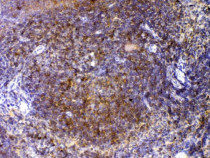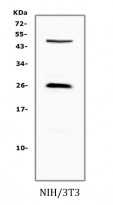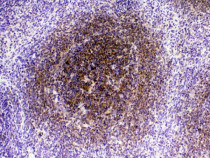ARG41918
anti-CD152 / CTLA4 antibody
anti-CD152 / CTLA4 antibody for IHC-Formalin-fixed paraffin-embedded sections,Western blot and Mouse,Rat
Overview
| Product Description | Rabbit Polyclonal antibody recognizes CD152 / CTLA4 |
|---|---|
| Tested Reactivity | Ms, Rat |
| Tested Application | IHC-P, WB |
| Host | Rabbit |
| Clonality | Polyclonal |
| Isotype | IgG |
| Target Name | CD152 / CTLA4 |
| Antigen Species | Mouse |
| Immunogen | Recombinant protein corresponding to E36-D161 of Mouse CD152 / CTLA4. |
| Conjugation | Un-conjugated |
| Alternate Names | GRD4; CTLA-4; CELIAC3; CD; Cytotoxic T-lymphocyte-associated antigen 4; CD152; GSE; CD antigen CD152; Cytotoxic T-lymphocyte protein 4; ALPS5; IDDM12 |
Application Instructions
| Application Suggestion |
|
||||||
|---|---|---|---|---|---|---|---|
| Application Note | IHC-P: Antigen Retrieval: Heat mediation was performed in Citrate buffer (pH 6.0, epitope retrieval solution) for 20 min. * The dilutions indicate recommended starting dilutions and the optimal dilutions or concentrations should be determined by the scientist. |
||||||
| Observed Size | 26 kDa |
Properties
| Form | Liquid |
|---|---|
| Purification | Affinity purification with immunogen. |
| Buffer | 0.2% Na2HPO4, 0.9% NaCl, 0.05% Sodium azide and 4% Trehalose. |
| Preservative | 0.05% Sodium azide |
| Stabilizer | 4% Trehalose |
| Concentration | 0.5 mg/ml |
| Storage Instruction | For continuous use, store undiluted antibody at 2-8°C for up to a week. For long-term storage, aliquot and store at -20°C or below. Storage in frost free freezers is not recommended. Avoid repeated freeze/thaw cycles. Suggest spin the vial prior to opening. The antibody solution should be gently mixed before use. |
| Note | For laboratory research only, not for drug, diagnostic or other use. |
Bioinformation
| Database Links | |
|---|---|
| Gene Symbol | CTLA4 |
| Gene Full Name | cytotoxic T-lymphocyte-associated protein 4 |
| Background | This gene is a member of the immunoglobulin superfamily and encodes a protein which transmits an inhibitory signal to T cells. The protein contains a V domain, a transmembrane domain, and a cytoplasmic tail. Alternate transcriptional splice variants, encoding different isoforms, have been characterized. The membrane-bound isoform functions as a homodimer interconnected by a disulfide bond, while the soluble isoform functions as a monomer. Mutations in this gene have been associated with insulin-dependent diabetes mellitus, Graves disease, Hashimoto thyroiditis, celiac disease, systemic lupus erythematosus, thyroid-associated orbitopathy, and other autoimmune diseases. [provided by RefSeq, Jul 2008] |
| Function | Inhibitory receptor acting as a major negative regulator of T-cell responses. The affinity of CTLA4 for its natural B7 family ligands, CD80 and CD86, is considerably stronger than the affinity of their cognate stimulatory coreceptor CD28. [UniProt] |
| Cellular Localization | Cell membrane; Single-pass type I membrane protein. Note=Exists primarily an intracellular antigen whose surface expression is tightly regulated by restricted trafficking to the cell surface and rapid internalisation;. [UniProt] |
| Calculated MW | 25 kDa |
| PTM | N-glycosylation is important for dimerization. Phosphorylation at Tyr-201 prevents binding to the AP-2 adapter complex, blocks endocytosis, and leads to retention of CTLA4 on the cell surface. [UniProt] |
Images (3) Click the Picture to Zoom In
-
ARG41918 anti-CD152 / CTLA4 antibody IHC-P image
Immunohistochemistry: Paraffin-embedded Mouse spleen tissue. Antigen Retrieval: Heat mediation was performed in Citrate buffer (pH 6.0, epitope retrieval solution) for 20 min. The tissue section was blocked with 10% goat serum. The tissue section was then stained with ARG41918 anti-CD152 / CTLA4 antibody at 1 µg/ml dilution, overnight at 4°C.
-
ARG41918 anti-CD152 / CTLA4 antibody WB image
Western blot: 50 µg of sample under reducing condition. NIH/3T3 whole cell lysate stained with ARG41918 anti-CD152 / CTLA4 antibody at 0.5 µg/ml dilution, overnight at 4°C.
-
ARG41918 anti-CD152 / CTLA4 antibody IHC-P image
Immunohistochemistry: Paraffin-embedded Rat lymphaden tissue. Antigen Retrieval: Heat mediation was performed in Citrate buffer (pH 6.0, epitope retrieval solution) for 20 min. The tissue section was blocked with 10% goat serum. The tissue section was then stained with ARG41918 anti-CD152 / CTLA4 antibody at 1 µg/ml dilution, overnight at 4°C.








